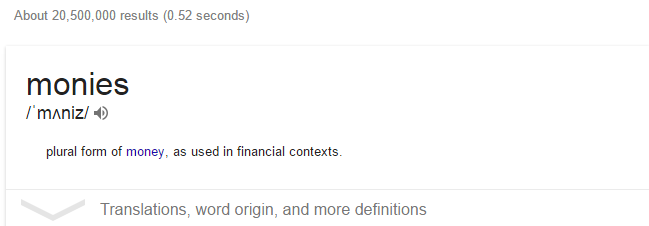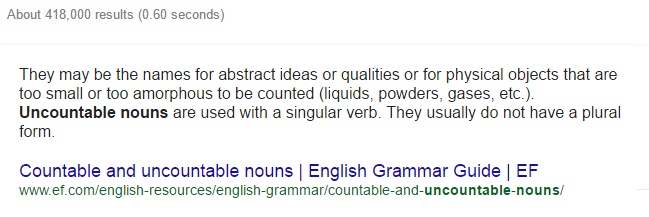I have studied that money is a mass noun, but now I saw that money can be in plural form as well. So I am confused. when we say on something that it's uncountable, then should it not be in one form only? (without singular/ plural - and like water, milk etc.)
-
Yes. For example, "monies owed" means "sums owed" [to various people].– MickCommented Nov 16, 2016 at 17:31
-
I'd have expected the "more regular" form moneys to be well out in front, particularly given Garner’s Modern American Usage and the AP Stylebook suggest that moneys is the better spelling. But apparently any monies owed has suddenly taken over in the last couple of decades.– FumbleFingersCommented Nov 16, 2016 at 18:01
-
@FumbleFingers: So, to clarify, you'd have expected moneys to be well out in front... in America. Right? Otherwise I don't see the relevance of an "American Usage" guide.– Lightness Races in OrbitCommented Nov 17, 2016 at 13:33
-
@Lightness Races in Orbit: I'm not a lawyer, but I've seen lots of legal texts over the years, and monies strikes me as a "quaint" spelling. Since I'm a Brit, I wouldn't often see American usages (I only cited Garners because that's what I found when I googled monies vs moneys), but checking NGram BrE/AmE corpuses for money/monies owed they look much the same to me.– FumbleFingersCommented Nov 17, 2016 at 13:52
-
I note that with a moneyed man/family/etc., that spelling is consistently more common than monied. As I suggested below, perhaps the latter has some special appeal to new entrants in the legal profession.– FumbleFingersCommented Nov 17, 2016 at 13:58
2 Answers
In ordinary usage, nouns like "milk" and "water" are uncountable. There are times, however, when such words do have a countable sense. For example, cows produce a different milk than goats. If I want to compare those two milks, then I'm using the word "milk" in a countable sense and phrases like "a different milk" and "those two milks" are natural and sensible.
In financial contexts, it is natural and sensible to talk about different countable monies. The USD and the Euro are two different monies. Taxable income and tax-free income are two different monies.
Strictly speaking, it isn't necessary to force a countable sense onto an uncountable noun. It is just as natural and sensible to talk about "two types of milk" or "two kinds of money", which allows "milk" and "money" to retain their ordinary, uncountable meanings. Your cited definition includes the phrase "as used in financial contexts". A better phrasing might be "as used in financial jargon".
-
5I've never heard of the US dollar and the euro being described as "monies", but as currencies. Sterling is reaping its best gains against higher-yielding commodity currencies like the South African Rand and Aussie Dollar at present. I'm not doubting that the plural form is ever used, but I would say it's extremely rare, and probably restricted to very specific instances, see @Hank's answer . Commented Nov 16, 2016 at 20:01
-
"I've never heard of the US dollar and the euro being described as "monies", but as currencies." They're called "monies", when they are, faute de mieux -- what terms could be used if not those? A writer would have to resort to circumlocution.– MMacDCommented Nov 16, 2016 at 20:26
-
6I'd say a better example is when you have two or more types of debt or income; these can be referred to as "monies owing" and "monies owed".– MöozCommented Nov 16, 2016 at 21:08
-
another use of monies is when you talk about the "monies market" where different types of money are exchanged Commented Nov 17, 2016 at 12:00
-
@MMacD: as Mari-Lou says, dollars and Euros are currencies, not monies. Commented Nov 17, 2016 at 14:41
Although Money is a mass noun, and therefore doesn't NEED a plural form, Garner and The Cambridge Guide to English Usage explain that Monies is usually used by legal or finance writers to talk about “individual sums” or “discrete sums” of money. That being said, Monies, and even Moneys, can technically be used to refer to the plural form of Money, despite most people disliking it.
Although it makes it more confusing, all rules come with rare exceptions.
-
1Re "or even moneys" - per my comment above, apparently Garner's actually recommend that form. But presumably a new generation of legal types like the somewhat archiac / "authoritative" overtones of the quaint oddball spelling monies. Commented Nov 16, 2016 at 18:05
-
Interestingly, Fowler has nothing to say on the subject at all.– MMacDCommented Nov 16, 2016 at 20:33


